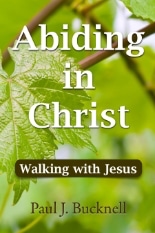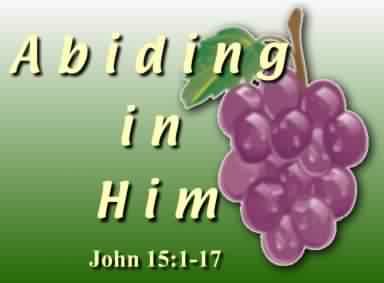
Abiding in Jesus Christ
~ A Study on Deepening Our
Relationship with Christ ~
~ Deepening our Relationship with Christ ~
John 15:1-17
Paul J. Bucknell
The Bible Teacher's Commentary Series
_________________________
Deepening Intimacy | Obedience | Assumptions
Means of
Intimacy #1 The Vinedresser | #2 True Vine | #3 Success |
#4 Means of Success | #5 Promise of Abiding | #6 Purpose of Abiding |
#7 Need of Obedience | #8 Need of Love | Friendship John 15:16-17 | Applying the Principles John 15:16 | Summary Principles |
Study Questions | Small Group Questions
Purpose
Abiding in Jesus Christ highlights eight ways to be more intimate with the Lord by expositing John 15:1-12 and then practically illustrates what 'Abiding in Christ practically means through a personal life event with John 15:15-16.
A Study on Deepening Our Relationship with Jesus
We have a challenge before us. Jesus tells us to ‘abide in Him.’ Either we will belong to Jesus or another. If we attach ourselves to Jesus, then we will believe His words. If we attach ourselves to some other philosophy or person, then we will follow the words of the leaders espousing those thoughts.
 The secular world says that the best life possible comes from living a life separate from God, His Word and His influence. The Christian viewpoint on the other hand says that the best life possible comes from living a life united with God through Christ and dependent upon His Word and His influence. Who is right?
The secular world says that the best life possible comes from living a life separate from God, His Word and His influence. The Christian viewpoint on the other hand says that the best life possible comes from living a life united with God through Christ and dependent upon His Word and His influence. Who is right?
Books and more books
We understand the confusion of the world when they think that secularism is the means to gain the greatest possible life they can have on earth. This perspective enables people to live for their passions, lusts and self-interests. Just two weeks ago, I was walking down a bookstore aisle innocent enough looking for a book for my wife. I was assaulted with an array of secular books.
 One special end section, which was set up to catch the attention of the unwary person passing by, was dedicated to erotic homosexual material. This stuff used to be illegal (and still is in many places) but now without shame they openly display it.
One special end section, which was set up to catch the attention of the unwary person passing by, was dedicated to erotic homosexual material. This stuff used to be illegal (and still is in many places) but now without shame they openly display it.
But it wasn’t just these kinds of books that preach secularism but cooking, healing, relationship, career, wealth books, etc. They are in common evangelizing people with the world’s message that living without God, His word and influence offers the best life possible. (Yes, there are other philosophies such as New Age, but the secular accent is certainly the strongest at this point.)
The message behind the books and magazines on being more beautiful are not to make you godlier or understand why God made you beautiful. Not at all.
They believe that by being more beautiful, you have more control over people and life. They believe that is where you will find fulfillment.
Christian believers and secularism
Although secularism dismisses the existence of God, there is a variant view which believers would attach themselves.  They might not even include themselves in this category of belief, but the best test is the choices they make in life. They believe that the best life comes from their own pursuits of life whether it be fame, wealth or pleasure. As believers, they accept that there is a God and in many cases say that they believe in Jesus. Many Christians are secularists, or should I more accurately say that many professing Christians are secularists.
They might not even include themselves in this category of belief, but the best test is the choices they make in life. They believe that the best life comes from their own pursuits of life whether it be fame, wealth or pleasure. As believers, they accept that there is a God and in many cases say that they believe in Jesus. Many Christians are secularists, or should I more accurately say that many professing Christians are secularists.
We started by stating that there are only two alternatives: either a person lives by Jesus’ words or one’s own words. John 15 superbly sets before us the two positions and showing how the Christian life is greater and contrary to the secularist’s viewpoint mentioned above.
Jesus’ most excellent way
Jesus’ way is so different from the world. We wonder how any Christian could adopt the false promises of secularism espousing the possibility of a good society without Christ. John targeted this very problem of belief when he wrote the Gospel of John. What we believe makes a great difference on our lives here on earth and throughout eternity.
Many professing Christians say they believe in Christ but do not believe. We know this by the life choices they make. They secretly believe that the world has more to offer. They are much like Lot’s wife who turned back or the man who escaped the tsunami. He went back to look for his stuff and was swept by another tidal wave.
=> Continue: The Importance of obedience
info@foundationsforfreedom.net
Scriptures typically quoted from the New American Standard Bible unless noted:
(C) Copyright The Lockman Foundation 1988










